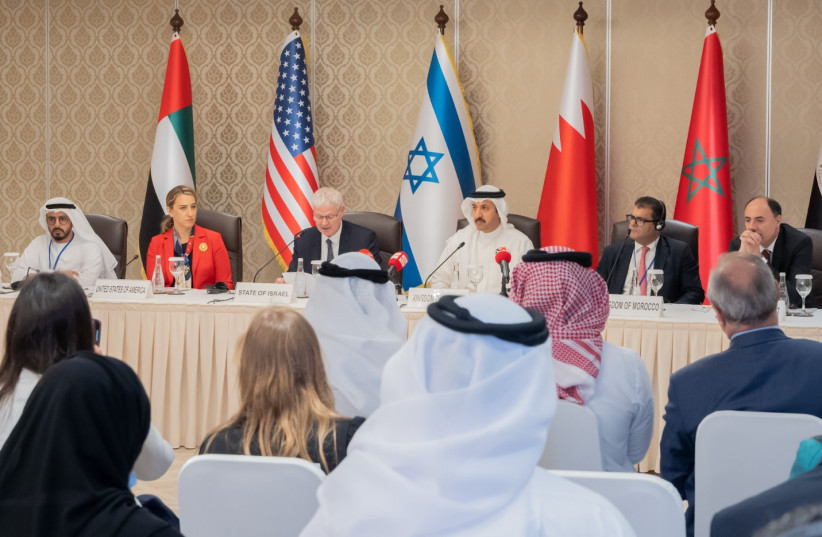In the past two-plus years Israel has signed agreements normalizing relations with four Arab/Muslim countries. The agreement with Sudan has remained in suspense until that country sorts out its domestic political problems. However, the agreements with Morocco, Bahrain and the United Arab Emirates have been enthusiastically implemented by both sides, resulting in greatly increased travel, trade and investment relations. In the case of Morocco, even a defense agreement has been signed.
Simultaneously, what has been referred to as the “cold peace” with Egypt has warmed up a great deal since the beginning of the Abraham Accord process. The same cannot be said of Jordan, but Saudi Arabia, the 800-pound gorilla of the Arabian Peninsula, without signing a formal agreement, has greatly expanded its interaction with Israel, and the expectation is that eventually the kingdom will join its neighbors in entering into an Abraham Accord with Israel, in which case Oman would certainly follow.
Leaving Morocco aside, the geopolitical significance of the accords has everything to do with the menace of a nuclear-armed Iran. Iran is busily trying to forge a “Shia northern crescent” of influence and control, running through Iraq and Syria to Lebanon. As of now, only Lebanon can be said to be firmly in Iran’s grip.
Anti-Iranian forces are active in Iraq. Syria is a blood-soaked playground for Russia, Turkey, Israel, the US, the Kurds and various terrorist organizations, which are all competing for control of territory and bases in the country. In addition, Iran’s support of the Houthi rebels in Yemen is a constant threat to outflank the Sunni states in the southern arc.
Nevertheless, should Iran gain nuclear capability, its efforts to establish and maintain control over substantial portions of the Middle East will be greatly enhanced, and Israel’s stock of nuclear weapons will become even more of an attraction to the Sunni countries.

Iran isn't the only Abraham Accords bonus
CERTAINLY, CONFRONTING Iran is an important geopolitical bonus of the Abraham Accords. But there could be another, which for some reason is being neglected by both sides.
There is no doubt that the Palestinian cause has been significantly damaged by the accord process. It is simply no longer a front-burner issue for most Sunni states. However, it remains a destabilizing factor for the region; as of now, no reasonable solution is on the horizon, mostly because neither the leadership of the Palestinian Authority nor of Gaza is willing to enter into meaningful negotiations.
A human time bomb, however, resides in the UAE, which if unleashed, could change the situation dramatically. For years, the main anti-Fatah and anti-Hamas Palestinian political figure, Mohammed Dahlan, has lived in the UAE. It is hard to understand why Israel and the UAE, with the support of Egypt, haven’t unleashed Dahlan against Abbas. Dahlan has substantial support in the West Bank (as well as in Gaza, where he is from) and Abbas is seen by the great majority of West Bank residents as a totally spent force.
To overthrow him and install Dahlan should be a slam dunk, and would result in a government in Ramallah that would be a willing and serious negotiating partner for Israel. If Dahlan takes over the PA, it is quite likely that Hamas in Gaza could also be overthrown by his adherents, since Hamas is increasingly unpopular in that territory.
Whether that happens or not is secondary. A meaningful solution to the West Bank conflict would be sufficient to effectively eliminate the Palestinian issue as a constant irritation to both Israel and its new Arab allies.
Why isn’t it being done?
The writer is a former senior official of the National Security Council and the Office of the Director of National Intelligence in the US.
